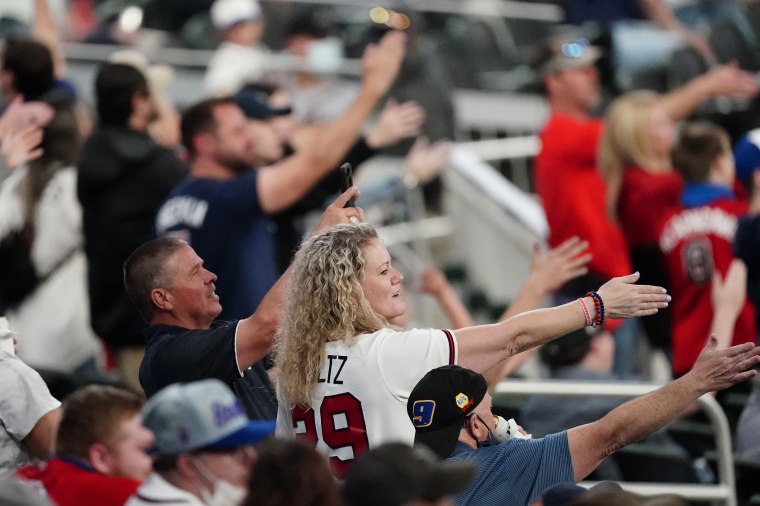Native American groups pushed back Wednesday against Major League Baseball Commissioner Rob Manfred's claim that Indigenous communities support the Atlanta Braves' tomahawk chop.
Manfred told reporters at the World Series on Tuesday that Native Americans near Atlanta don't mind the sight of Braves fans' chanting in a faux battle cry during games at Truist Park in Cobb County, north of Atlanta.
"The Braves have done a phenomenal job with the Native American community," Manfred said on the field at Minute Maid Park in Houston. "The Native American community in that region is wholly supportive of the Braves' program, including the chop.
"And for me, that's kind of the end of the story," he continued. "In that market, taking into account the Native American community, it works."
But Jason Salsman, a spokesman for Chief David Hill of the Muscogee Nation, said Manfred can't base his opinion on any one stance from a Native community.
"If you just go out and get a group here or there and say you're good, I don't think that's how Indian Country works," Salsman said. "You need to speak to the whole of Indian Country and make sure that you get a grand consensus. I wouldn't say that they have that."
The ancestral homelands of the Muscogee Nation, before its forced relocation to what is now Oklahoma along the deadly Trail of Tears in the 19th century, are in what is now Georgia. The tribe doesn't support the tomahawk chop.
"I think for us, with the tomahawk chop, you're not getting anything really authentic," Salsman said. "You're getting something that's more of a caricature."
Manfred said he consulted with local Cherokees. None of the three federally recognized bands of Cherokees is based in Georgia.
The Cherokee Nation and the United Keetowah Band of Cherokee Indians were forcibly removed to Oklahoma, where they remain. The Eastern Band of Cherokee Indians remains in nearby North Carolina, and Principal Chief Richard Sneed has said for years that the tribe doesn't support the Braves' cheer.
Crystal Echo Hawk, an enrolled member of the Pawnee Nation of Oklahoma who is president of the Indigenous advocacy group IllumiNative, said: "We can't let this just be a local Native issue. The imagery, chant, red face aren't just impacting locally — it's impacting all Natives."
Stephanie Fryberg, a professor of psychology at the University of Michigan and a member of the Tulalip Tribes, said the effect of such mascots and gestures is not always immediately obvious."The Commissioner’s comment focuses solely on peoples’ attitudes, but ignores the fact that there are decades of research that document the psychological harm associated with Native-themed mascots and related gameday behavior," she said in a statement.
The Washington Football Team changed its racist nickname last year, and Cleveland's baseball team has ditched its long-held moniker for a new brand, the Guardian, beginning next year.
Echo Hawk and others have also pointed out that psychological research has shown for years that the use of Native American imagery and mascots in sports has negative consequences for the mental health of both Native and non-Native children.


